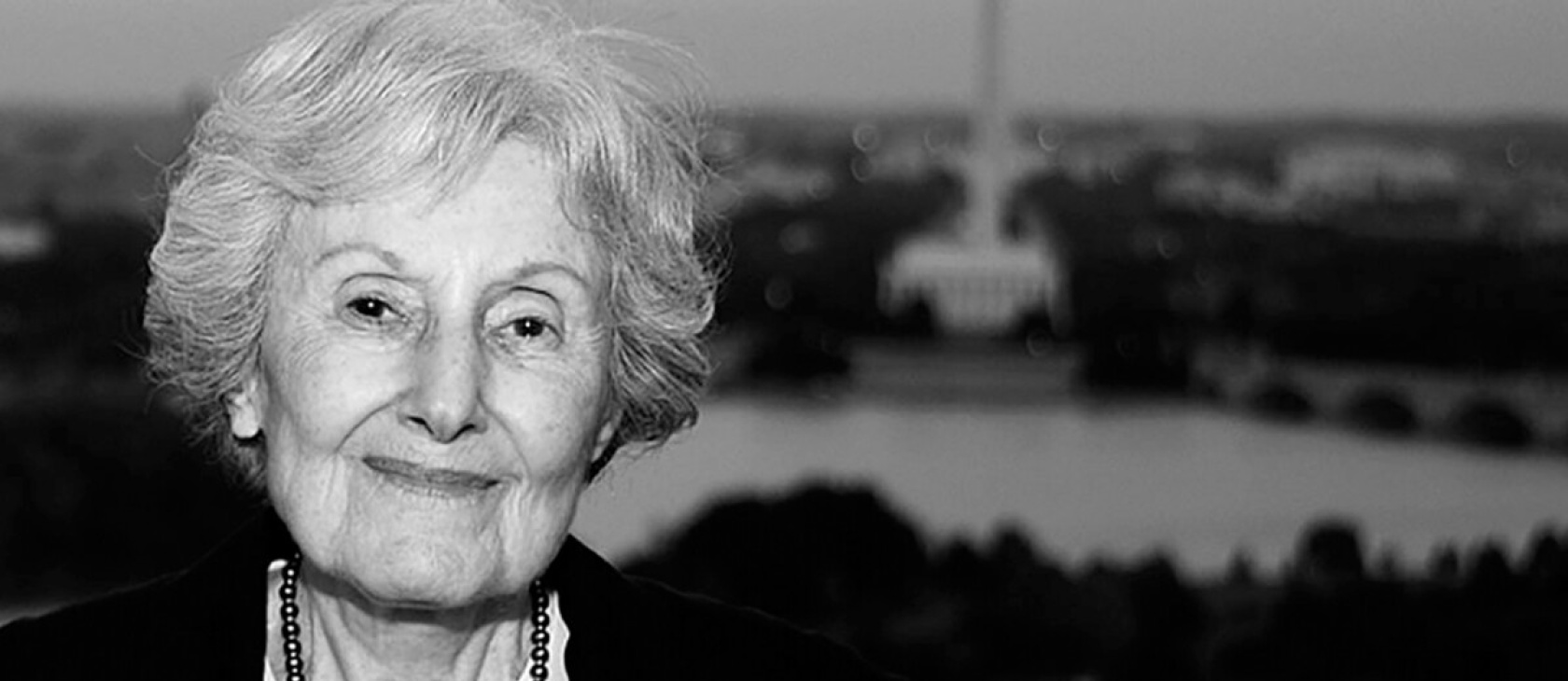Intellectual historians can serve their societies as guides in wayward times. If they are willing to look at the past not as a primitive patchwork of error and sin, but as an arena of human action free of the present’s particular prejudices, they can learn to see in their own time and place what is invisible to their contemporaries.
NEH chairman Jon Parrish Peede perhaps said it best: “The life and work of Gertrude Himmelfarb enriched … the humanities across our country, as her studies in nineteenth-century England became an increasingly salient point of reference for discussions on morality, social policy, and public virtues in late twentieth-century America.”
Lord Acton may be the highest exemplar of such a historian in our tradition. But it was Acton’s most profound 20th century interpreter, the great American historian Gertrude Himmelfarb (1922–2019), who best described this mode of scholarship, and best understood what it might offer us today.
Born in Brooklyn to Russian Jewish parents, nothing about Himmelfarb’s background or early education quite explains why she became fascinated by the intellectual life of Victorian Britain. But by the age of 28, and married by then to Irving Kristol (whose own path to intellectual greatness was only beginning), she had completed a Ph.D. in history at the University of Chicago and determined that Acton would be her first great subject.
Her dissertation was soon published as Lord Acton: A Study in Conscience and Politics. And it established at that early age the set of interests and concerns that would dominate Himmelfarb’s work for the subsequent seven decades.
She found Acton and other leading Victorians particularly instructive regarding what she termed “the paradox of liberalism”—the idea that, in prioritizing individual liberty above all other political goods, modern liberalism threatened to undermine the moral foundations of individual liberty, and therefore of its own strength.
Acton was a keen student of this problem, and he understood it to be rooted in an ideal of the individual that had its merits but was frequently taken too far. His answer was not to abandon liberalism but to insist that it be tethered to traditional religion, to the benefit of both. “The liberals wanted political freedom at the expense of the church,” Himmelfarb wrote, “and the traditional Catholics wanted the church at the expense of political freedom. Acton knew that in a non-Catholic state the church’s freedom could only be guaranteed by a free society so that people who wanted religious freedom needed to be friends of genuine liberal freedom.” But he also knew that they needed to insist that religious freedom was a fundamentally communal freedom, and therefore that liberal societies must be made aware of more than individual liberties and prerogatives.
The relevance of this insight for our own time is all too clear. But for Himmelfarb, too, writing in the early 1950s, Acton offered a powerfully compelling case for both the necessity and the limits of the liberal order, and for the need to root it in pre-liberal truths.
It was not only Acton who offered a model of how this might work. Victorian Britain more generally stood as a powerful example, and Himmelfarb devoted herself to exploring the character of that era.
At first this work took the form of powerful, compelling essays written over two decades (and collected in Victorian Minds: A Study of Intellectuals in Crisis and Ideologies in Transition, published in 1968) and of three extensive intellectual biographies—of Acton (in 1952), Charles Darwin (in 1959), and John Stuart Mill (in 1974).
It was at the end of her extraordinary study of Mill that Himmelfarb gave clearest expression to the worry she could never shake. As she put it:
Having made an absolute of liberty and having established the individual as sovereign, the liberal has no integrated view of the individual in society which can moderate either his passion for liberty or his desire for regulation and control. When liberty proves inadequate, government rushes in. And since the only function assigned to government by the principle of liberty is the negative one of protection against injury, when government is obliged to assume a positive role, neither its proper powers nor its proper limits have been defined. The paradox is inevitable: government tends to become unlimited when liberty itself is thought to be unlimited. The paradox brings others in its wake. While contemporary liberalism has enormously enhanced the roles of society, government, and the state, it has provided them with no principles of legitimacy.
The result is a recipe for social breakdown and political disillusionment—for what Himmelfarb termed “de-moralization.” It is a recipe she feared our society had set out to follow.
At that point, in the middle of the 1970s, Himmelfarb began to take a turn that mirrored the one Acton had taken. She went from being a historian of Victorian moralism to being also a Victorian-style moralist in her own time and place. That does not mean that she became a political activist. Her work retained the character of historical scholarship. But she came to think that the moral renewal achieved by Victorian Britain had some distinct lessons for her contemporaries, and she set out to analyze that achievement.
The Victorians had not merely spent moral capital amassed in prior ages. They had actually built up such capital themselves, through a moral and religious revolution of their own and also through intellectual exertions that could inform their successors.
So how had they done it? The Victorians, Himmelfarb argued, had essentially invented the modern concept of poverty, understood not simply as a social fact but as a moral problem that demanded the attention of society. This demand was answered both with a moral code (which emphasized responsibility) and with what we would now call a policy agenda (which emphasized compassion). And the two combined to “moralize” the politics of the Victorian age in a way that did enormous good not only for the poor as the larger society came to embrace the market economy.
“Compassion” was the most original of the essential concepts of this intellectual revolution. Drawing on Methodism and on the Scottish Enlightenment and its English evangelists, it combined sympathy and moral ambition in a way that ultimately added up to an entire social vision that turned out to be uniquely capable of powering renewal.
Himmelfarb’s work on this front proved exceptionally influential. Under its guidance, that portion of the American right inclined to insist on the moral character of political debates made compassion its watchword and emphasized moral culture—and especially marriage, childbearing, religion, and community—as a necessary complement to the market economy. George W. Bush’s “compassionate conservatism” was only the most obvious example, but the influence of this mode of thought is apparent over decades in every form of the conservative recoil from the (often-caricatured) libertarian framework of the right’s economic thinking. It is plainly present in today’s debates, even if their participants have not heard of Himmelfarb.
Over more than 70 years of engaging and careful scholarship, Gertrude Himmelfarb not only enabled us to know the Victorians far better; she also made it possible for us to answer the ever-present fear of irrevocable decline with a model of the replenishment of moral capital—and so of the possibility of renewal. A historian with moral clarity and purpose, her influence will continue to reverberate for as long as liberalism’s future depends upon its friendly critics.




